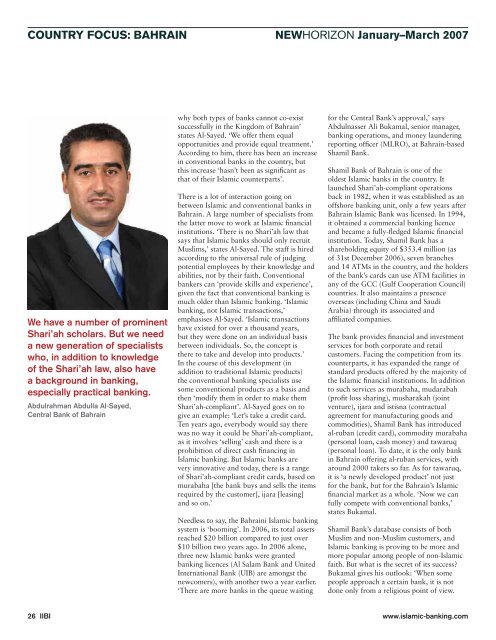issue no. 163 - january–march 2007 / muharram–rabi al awwal 1428
issue no. 163 - january–march 2007 / muharram–rabi al awwal 1428
issue no. 163 - january–march 2007 / muharram–rabi al awwal 1428
- No tags were found...
Create successful ePaper yourself
Turn your PDF publications into a flip-book with our unique Google optimized e-Paper software.
COUNTRY FOCUS: BAHRAIN<br />
NEWHORIZON January–March <strong>2007</strong><br />
We have a number of prominent<br />
Shari’ah scholars. But we need<br />
a new generation of speci<strong>al</strong>ists<br />
who, in addition to k<strong>no</strong>wledge<br />
of the Shari’ah law, <strong>al</strong>so have<br />
a background in banking,<br />
especi<strong>al</strong>ly practic<strong>al</strong> banking.<br />
Abdulrahman Abdulla Al-Sayed,<br />
Centr<strong>al</strong> Bank of Bahrain<br />
why both types of banks can<strong>no</strong>t co-exist<br />
successfully in the Kingdom of Bahrain’<br />
states Al-Sayed. ‘We offer them equ<strong>al</strong><br />
opportunities and provide equ<strong>al</strong> treatment.’<br />
According to him, there has been an increase<br />
in convention<strong>al</strong> banks in the country, but<br />
this increase ‘hasn’t been as significant as<br />
that of their Islamic counterparts’.<br />
There is a lot of interaction going on<br />
between Islamic and convention<strong>al</strong> banks in<br />
Bahrain. A large number of speci<strong>al</strong>ists from<br />
the latter move to work at Islamic financi<strong>al</strong><br />
institutions. ‘There is <strong>no</strong> Shari’ah law that<br />
says that Islamic banks should only recruit<br />
Muslims,’ states Al-Sayed. The staff is hired<br />
according to the univers<strong>al</strong> rule of judging<br />
potenti<strong>al</strong> employees by their k<strong>no</strong>wledge and<br />
abilities, <strong>no</strong>t by their faith. Convention<strong>al</strong><br />
bankers can ‘provide skills and experience’,<br />
given the fact that convention<strong>al</strong> banking is<br />
much older than Islamic banking. ‘Islamic<br />
banking, <strong>no</strong>t Islamic transactions,’<br />
emphasises Al-Sayed. ‘Islamic transactions<br />
have existed for over a thousand years,<br />
but they were done on an individu<strong>al</strong> basis<br />
between individu<strong>al</strong>s. So, the concept is<br />
there to take and develop into products.’<br />
In the course of this development (in<br />
addition to tradition<strong>al</strong> Islamic products)<br />
the convention<strong>al</strong> banking speci<strong>al</strong>ists use<br />
some convention<strong>al</strong> products as a basis and<br />
then ‘modify them in order to make them<br />
Shari’ah-compliant’. Al-Sayed goes on to<br />
give an example: ‘Let’s take a credit card.<br />
Ten years ago, everybody would say there<br />
was <strong>no</strong> way it could be Shari’ah-compliant,<br />
as it involves ‘selling’ cash and there is a<br />
prohibition of direct cash financing in<br />
Islamic banking. But Islamic banks are<br />
very in<strong>no</strong>vative and today, there is a range<br />
of Shari’ah-compliant credit cards, based on<br />
murabaha [the bank buys and sells the items<br />
required by the customer], ijara [leasing]<br />
and so on.’<br />
Needless to say, the Bahraini Islamic banking<br />
system is ‘booming’. In 2006, its tot<strong>al</strong> assets<br />
reached $20 billion compared to just over<br />
$10 billion two years ago. In 2006 <strong>al</strong>one,<br />
three new Islamic banks were granted<br />
banking licences (Al S<strong>al</strong>am Bank and United<br />
Internation<strong>al</strong> Bank (UIB) are amongst the<br />
newcomers), with a<strong>no</strong>ther two a year earlier.<br />
‘There are more banks in the queue waiting<br />
for the Centr<strong>al</strong> Bank’s approv<strong>al</strong>,’ says<br />
Abdulnasser Ali Bukam<strong>al</strong>, senior manager,<br />
banking operations, and money laundering<br />
reporting officer (MLRO), at Bahrain-based<br />
Shamil Bank.<br />
Shamil Bank of Bahrain is one of the<br />
oldest Islamic banks in the country. It<br />
launched Shari’ah-compliant operations<br />
back in 1982, when it was established as an<br />
offshore banking unit, only a few years after<br />
Bahrain Islamic Bank was licensed. In 1994,<br />
it obtained a commerci<strong>al</strong> banking licence<br />
and became a fully-fledged Islamic financi<strong>al</strong><br />
institution. Today, Shamil Bank has a<br />
shareholding equity of $353.4 million (as<br />
of 31st December 2006), seven branches<br />
and 14 ATMs in the country, and the holders<br />
of the bank’s cards can use ATM facilities in<br />
any of the GCC (Gulf Cooperation Council)<br />
countries. It <strong>al</strong>so maintains a presence<br />
overseas (including China and Saudi<br />
Arabia) through its associated and<br />
affiliated companies.<br />
The bank provides financi<strong>al</strong> and investment<br />
services for both corporate and retail<br />
customers. Facing the competition from its<br />
counterparts, it has expanded the range of<br />
standard products offered by the majority of<br />
the Islamic financi<strong>al</strong> institutions. In addition<br />
to such services as murabaha, mudarabah<br />
(profit loss sharing), musharakah (joint<br />
venture), ijara and istisna (contractu<strong>al</strong><br />
agreement for manufacturing goods and<br />
commodities), Shamil Bank has introduced<br />
<strong>al</strong>-ruban (credit card), commodity murabaha<br />
(person<strong>al</strong> loan, cash money) and tawaruq<br />
(person<strong>al</strong> loan). To date, it is the only bank<br />
in Bahrain offering <strong>al</strong>-ruban services, with<br />
around 2000 takers so far. As for tawaruq,<br />
it is ‘a newly developed product’ <strong>no</strong>t just<br />
for the bank, but for the Bahrain’s Islamic<br />
financi<strong>al</strong> market as a whole. ‘Now we can<br />
fully compete with convention<strong>al</strong> banks,’<br />
states Bukam<strong>al</strong>.<br />
Shamil Bank’s database consists of both<br />
Muslim and <strong>no</strong>n-Muslim customers, and<br />
Islamic banking is proving to be more and<br />
more popular among people of <strong>no</strong>n-Islamic<br />
faith. But what is the secret of its success?<br />
Bukam<strong>al</strong> gives his outlook: ‘When some<br />
people approach a certain bank, it is <strong>no</strong>t<br />
done only from a religious point of view.<br />
26 IIBI www.islamic-banking.com
















